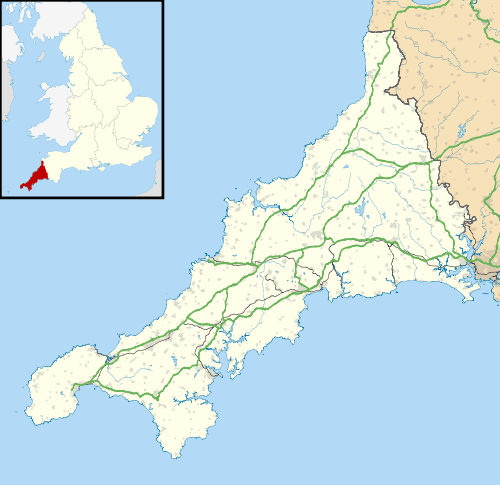Gweek
| Gweek | |
| Cornish: Gwig | |
| The east bank of the river, viewed from the quay |
|
 Gweek |
|
| Population | 581 (Civil Parish, 2001) |
|---|---|
| OS grid reference | SW705268 |
| Civil parish | Gweek |
| Unitary authority | Cornwall |
| Ceremonial county | Cornwall |
| Region | South West |
| Country | England |
| Sovereign state | United Kingdom |
| Post town | HELSTON |
| Postcode district | TR12 |
| Dialling code | 01326 |
| Police | Devon and Cornwall |
| Fire | Cornwall |
| Ambulance | South Western |
| EU Parliament | South West England |
| UK Parliament | Camborne and Redruth |
Coordinates: 50°05′46″N 5°12′32″W / 50.096°N 5.209°W
Gweek (Cornish: Gwig, meaning forest village) is a civil parish and village in Cornwall, England, United Kingdom. It is situated approximately three miles (5 km) east of Helston.[1] The civil parish was created from part of the parish of Constantine by boundary revision in 1986. The name Gweek is first recorded as Gwyk in 1358 and is derived from the Cornish word gwig, meaning "forest village", cognate with the Welsh gwig and Old Breton guic.[2]
Gweek lies within the Cornwall Area of Outstanding Natural Beauty (AONB). Almost a third of Cornwall has AONB designation, with the same status and protection as a National Park.
Gweek village has a pub, the Black Swan,[3] and a combined shop and post office. The village is also home to the Cornish Seal Sanctuary.
Gweek is at the head of navigation of the Helford River. It has been a port since Roman times and was a thriving port in the Tudor period, with its own Customs House.[4] During the mining boom, a tin-smelting blowing house operated at the quayside.[5]
In Lewis's Topographical Dictionary of England published in 1848, the village was described as:[6]
GWEEK, a small port, in the hundred of Kerrier, W. division of Cornwall, 3½ miles (E. by S.) from Helston. The pilchard-fishery is carried on extensively, 200 boats being employed in taking the fish, which are cured in the various creeks and coves within the limits of the port. In addition to the fishery, the chief trade consists in the exportation of copper-ore, corn, moorstone, and oysters, and the importation of timber, coal, and limestone.
In the 13th century, the townspeople of Helston buy the rights to the port of Gweek at the head of the Helford River.[7]
Musical activities
Gweek has a silver band[8] which performs locally and provides music at some Anglican services in the Gweek Mission Church. The band also organises a yearly "band week". This starts with a concert of three local brass bands in a field overlooking the Helford River. Afterwards, there is a pig roast with stalls and entertainment and at the end of the week a clay pigeon shoot.
The Cornwall Fiddle Orchestra[9] was formed in 2007 by fiddle player Hudson Swan. He was a member of Scottish band, The Tannahill Weavers but now lives in Cornwall and works as a violin teacher for the Cornwall Music Service.[10] The orchestra rehearses weekly at Helston School.
In literature
Gweek is featured in The Meaning of Liff, a book by Douglas Adams and John Lloyd.
References
- ↑ Ordnance Survey: Landranger map sheet 203 Land's End ISBN 978-0-319-23148-7
- ↑ Weatherhill C. (2007) Cornish Place Names and Language. Ammanford: Sigma Press
- ↑ "The Gweek Inn".
- ↑ Scolding, Bill (2006) Five Walks around Constantine: heritage, landscape, wildlife. Constantine, Kerrier: Constantine Enterprises Company ISBN 0-9552816-0-1
- ↑ Barton, D. Bradford (1969) A History of Tin Mining and Smelting in Cornwall; revised edition. Cornwall Books, reprint 1989 ISBN 1-871060-03-6; p. 20 fn
- ↑ "'Gunthorpe - Gyhirn', A Topographical Dictionary of England (1848), pp. 360-62". Retrieved 2007-07-04.
- ↑ Le. Messurier, B. and Luck, L. (1998) Loe Pool and Mount's Bay. No. 12 in The National Trust Coast of Cornwall series of leaflets
- ↑ "Gweek Silver Band".
- ↑ "Cornwall Fiddle Orchestra website".
- ↑ "Cornwall Music Service".
| Wikimedia Commons has media related to Gweek. |